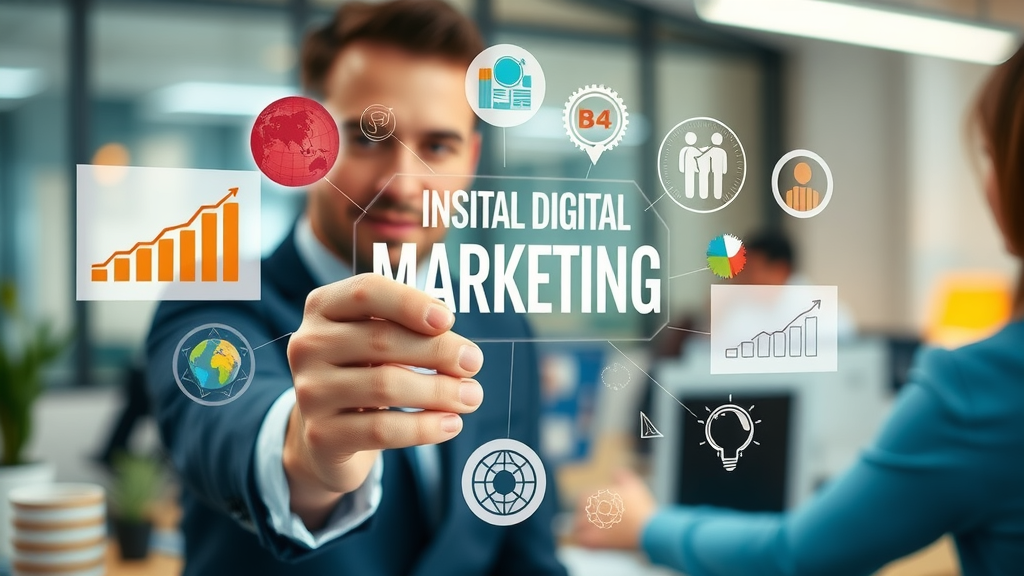The digital marketing landscape is expanding rapidly, projected to grow to $546 billion by 2024. **Have you ever wondered how you could become a part of this burgeoning industry?** This comprehensive guide will provide you with everything you need to know about starting a digital marketing agency. From understanding the market to crafting a robust business plan, this article sets the stage for creating a successful agency.
Introduction to Starting a Digital Marketing Agency
In the current digital age, the demand for digital marketing services is higher than ever. Starting a digital marketing agency involves impactful planning and strategic execution. Much like launching any other business, it requires a deep understanding of your market, a solid business plan, and a clear marketing strategy. Let's dive into what it takes to start a digital marketing agency and explore some practical examples along the way.
One of the first steps in starting a digital marketing agency is understanding the digital landscape. This includes acknowledging and adapting to trends like search engine optimization, content marketing, and social media engagement. **The key is to offer something unique that separates your agency from the competition.**
Understanding the Digital Marketing Landscape

The digital marketing landscape is dynamic and constantly evolving. It includes everything from social media marketing to pay-per-click advertising. Understanding this landscape involves knowledge of different platforms, technologies, and trends. For instance, marketing agencies must stay updated on algorithm changes in search engines that can impact SEO and affect online visibility. Keeping pace with emerging technologies not only helps in offering cutting-edge services but also positions your agency as a leader in digital strategies.
Familiarizing yourself with analytics tools to measure campaign performance is another critical component. These tools provide insights into traffic, engagement, and conversion rates, making it easier to tailor strategies to optimize results. An insightful approach towards data can grant agencies an edge in offering bespoke solutions to clients, effectively addressing their unique needs.
Exploring Core Concepts: Social Media and SEO
**Social media and SEO are the cornerstone of any successful digital marketing strategy.** Social media platforms serve as fantastic avenues for brand engagement and audience interaction. They facilitate organic and paid outreach, enhancing brand visibility. Managing these accounts effectively requires expertise in content creation, audience targeting, and community management.
Search engine optimization (SEO), on the other hand, is crucial for increasing a brand's visibility on search engines. By optimizing a website's content with relevant keywords and building quality backlinks, an agency can help businesses improve their search engine rankings. An effective SEO strategy involves on-page and off-page tactics, technical SEO audits, and continuous performance tracking.
Crafting Your Business Plan
A business plan serves as the foundation for any venture. When you're looking to start a digital marketing agency, it's essential to have a clear, concise plan that outlines your objectives, strategies, and financial forecasts. A well-crafted business plan not only guides you but also attracts potential investors and partners.
Key Components of a Business Plan
A digital marketing agency's business plan should include several key components. Start by defining your agency's mission statement, detailing the values and goals that will guide your operations. Include a comprehensive market analysis, offering insights into your competition and identifying your ideal client. Your business plan must also provide a detailed look into the services your agency will offer, setting a clear focus for your marketing strategies.
Additionally, financial projections and funding requirements are crucial. Outline your projected incomes, expenses, and investment needs over the first few years of operation. Lastly, include a growth strategy that details how your agency will scale over time. This will include expanding service offerings and exploring partnership opportunities.
Market Research and Identifying Your Ideal Client

Conducting thorough market research is pivotal for understanding your target audience and crafting strategies that resonate with them. **Market research helps you identify your ideal client—those businesses or individuals that will most benefit from your services.** By assessing competitors and analyzing consumer behavior, you can refine your agency's offerings and tailor your marketing efforts accordingly.
Understanding the pain points and preferences of your potential clients enables you to develop targeted solutions and effectively communicate your value proposition. This client-centric approach facilitates long-term client relationships and contributes to your agency's reputation as a trusted digital marketing partner.
Defining Your Marketing Strategy
A successful marketing strategy is the lifeline of any digital marketing agency. It encompasses how you'll attract and retain clients, differentiate your brand, and achieve your business goals. Start by defining the marketing services your agency will focus on, such as SEO, content marketing, or social media management.
To create an effective marketing strategy, you need to analyze market trends and develop a unique selling proposition (USP) that distinguishes your agency from competitors. Consistently evaluating and adjusting your strategy is vital to adapt to market changes and client needs, ensuring sustained growth and success.
Building a Robust Business Model
Creating a scalable business model is integral to the long-term success of a digital marketing agency. A robust model enables you to manage resources efficiently, deliver exceptional services, and drive profitability. Consider your pricing strategy, service tiering, and revenue streams while developing your agency's business model.
Structuring a Digital Marketing Agency
The structure of a digital marketing agency often depends on its size and offering. **A well-structured agency operates with clear roles and responsibilities, fostering collaboration across departments.** Structuring may start with basic teams for content creation, SEO, and social media management. As you expand, consider specialized roles like data analysts and UX designers to enhance service delivery.
Implementing agile project management practices can improve workflow efficiency and adapt to project changes quickly. Regular team meetings and an open communication channel ensure that everyone is aligned with the agency's goals and client expectations.
Leveraging Search Engine Optimization for Growth

SEO is a powerful tool that can significantly influence an agency's growth trajectory. By leveraging search engine optimization, your agency can not only enhance its visibility but also attract organic prospects. SEO strategies involve optimizing website content, improving site speed, and securing high-quality backlinks. To maintain an edge, stay updated on search engine algorithm changes and adjust your tactics accordingly.
Incorporating local SEO practices can attract clients within specific geographical regions, while technical audits ensure your website meets search engine guidelines. Investing in SEO tools and analytics software fosters continual improvement and allows you to measure the impact of your efforts accurately.
Implementing Content and Lead Generation Strategies
Content marketing is an indispensable component of digital marketing that fosters brand awareness and generates leads. By implementing comprehensive content and lead generation strategies, your agency can attract, engage, and convert prospects into clients. **Effective content types include blog posts, e-books, webinars, and case studies tailored to your target audience's preferences and pain points.**
Lead generation efforts can be maximized by using landing pages with optimized calls-to-action (CTAs), lead magnets, and nurturing email campaigns. Tracking content performance through analytics tools guides future strategies and enhances overall effectiveness, contributing to sustained business growth.
Navigating Financial Aspects
Finance plays a crucial role in starting any business, inclusive of a digital marketing agency. Understanding the financial aspects helps in better resource allocation and planning for both immediate needs and future growth.
Understanding Costs: How Much Does It Cost to Start?
The cost of starting a digital marketing agency can vary significantly depending on factors such as location, services offered, and team size. Initial costs could range from minimal investment in home-office setups to substantial capital for rentals and advanced technology. **Basic costs often include office space, tech equipment, marketing materials, and subscriptions to software essential for daily operations.**
Outlining a detailed budget that covers all foreseeable expenses can prevent financial strain and allow for unforeseen contingencies. Efficient financial management includes ongoing monitoring of expenses and adjustments as necessary to optimize the agency's financial health.
Projecting Profitability: Is It Profitable?

The profitability of a digital marketing agency largely depends on the effective management of operations and successful client acquisition. Offering diverse services and delivering high-quality results enhance profitability through repeat business and referrals. Profitability is further influenced by pricing strategies, service efficiency, and overall market demand.
Conducting a detailed break-even analysis and setting realistic profitability goals assist in maintaining motivation and focus on essential tasks that drive growth. Diversifying revenue streams and upselling additional services can significantly increase profit margins.
Legal and Operational Setup
The operational foundation and legal framework are fundamental to starting a smooth and compliant digital marketing agency. This involves aligning with legal standards and adopting efficient operational tools.
Regulatory Requirements and Compliance
Starting a digital marketing agency requires adherence to legal regulations and industry standards. Securing the necessary licenses, certifications, and insurance protects your business and instills confidence in clients. Compliance with data protection laws, such as GDPR, is critical in maintaining trust and safeguarding sensitive client information.
Engaging legal counsel can help navigate complex legal areas, ensuring your agency is fully compliant and legally sound. Constantly updating your compliance practices reflects commitment and professionalism, further solidifying client relationships.
Operational Efficiency: Tools and Technologies

Incorporating advanced tools and technologies is pivotal for operational efficiency and client satisfaction. Project management software, CRM systems, and marketing automation tools significantly enhance productivity and streamline workflows. Selecting the right tools depends on the agency's size, needs, and budget.
Training employees in new technologies ensures the agency maintains its competitive edge and consistently delivers value-driven services. Regularly evaluating and upgrading tools align with evolving market demands and maintain service efficiency.
Hiring and Team Building
An effective team is at the heart of any successful digital marketing agency. Hiring the right talent and fostering a collaborative work environment are key to achieving business objectives.
Recruiting Skilled Talent

Recruiting skilled talent is crucial in building a capable and innovative digital marketing team. Targeting individuals with diverse skill sets and experiences enriches the team and enhances service delivery. Utilizing job boards, social media platforms, and recruitment agencies are effective ways to reach potential candidates.
Prioritizing soft skills such as creativity, communication, and problem-solving in recruitment processes contributes to a dynamic and resilient team. A structured onboarding process ensures new employees are well-integrated and productive from the outset.
Cultivating a Collaborative Work Environment
Cultivating a collaborative work environment encourages creativity, innovation, and employee satisfaction. **Promoting open communication, team-building activities, and flexible work arrangements create a sense of belonging and motivation within the team.**
Regular feedback and recognition foster professional growth and commitment to agency goals. Encouraging collaboration across teams enhances problem-solving capabilities and drives better results for clients.
Effective Promotion and Marketing
Promotion and marketing are integral in establishing brand awareness and attracting potential clients. A strategic approach to promotion can realize your agency's outreach goals effectively and position you as an industry leader.
Developing a Comprehensive Marketing Plan
A comprehensive marketing plan outlines your promotion strategies, target audience, and performance metrics. Establish what promotional channels align with your business goals, such as online marketing, paid advertising, or content marketing. **Defining clear KPIs and regularly evaluating performance ensures strategies remain effective and adaptable to market shifts.**
Utilizing Social Media for Enhanced Reach

Social media platforms are invaluable tools for expanding your agency's reach and engaging with your audience. Successful use of social media involves active interaction, impactful content, and strategic advertising. **Leveraging platforms like Instagram, LinkedIn, and Facebook, you can share case studies, success stories, and promotional offers, demonstrating your agency's expertise and value.**
Consistency in posting, monitoring metrics, and engaging with your followers promote brand loyalty and awareness. Understanding the nuances of each platform allows for personalized strategies that capture and maintain audience attention.
Scaling and Growth Strategies
Scaling your digital marketing agency requires strategic expansion of services and networks. **A comprehensive growth strategy guides your agency's evolution, ensuring sustained prosperity and increased market presence.**
Expanding Service Offerings
Diversifying your service offerings presents opportunities to cater to a broader range of clients and stand out in the competitive digital marketing landscape. **Consider adding services like influencer marketing, advanced analytics, or specialized content creation.** Expanding your expertise in niche areas can increase client retention and attract new markets.
Measuring the demand for additional services through client feedback and market analysis supports informed decisions. Training your team to adapt to new services maintains high standards of delivery and client satisfaction.
Exploring Partnership and Networking Opportunities

Building alliances with complementary businesses can be a powerful strategy for growth. **Partnerships facilitate resource sharing, collaborative projects, and accessing new client bases.** Hosting or attending industry events enhances visibility and networking opportunities, fostering stronger industry ties.
Developing a reputation for innovation and results-driven service attracts potential partners and opportunities for collaboration. Mutually beneficial relationships create a platform for knowledge exchange, contributing to both parties' success.
People Also Ask
How much does it cost to start a digital agency?
The cost to start a digital agency can vary, typically ranging from a few thousand dollars for smaller setups to tens of thousands for full-scale operations. Costs include basic office necessities, technology, and initial marketing efforts.
How much do you need to start a digital marketing agency?
Starting a digital marketing agency requires capital for licenses, office supplies, software subscriptions, and salaries. Initial investments depend on the scale of your venture, with startups potentially beginning with a $5,000 to $10,000 budget range.
How profitable is a digital marketing agency?
A digital marketing agency is potentially very profitable, especially with a steady flow of clients and well-managed overheads. Profit margins can grow significantly as you establish a strong client base and expand service offerings.
How to start up a digital marketing company?
To start a digital marketing company, begin with thorough market research and create a solid business plan. Use your findings to define your services and ideal client. Establish your company legally, invest in the right tools, and start marketing your agency.
Conclusion and Next Steps
Starting a digital marketing agency requires strategic planning, understanding the market, and consistently innovating your offerings. By following the steps outlined in this guide, you can set a solid foundation for a successful venture in the digital realm.
 Add Row
Add Row  Add
Add 




Write A Comment